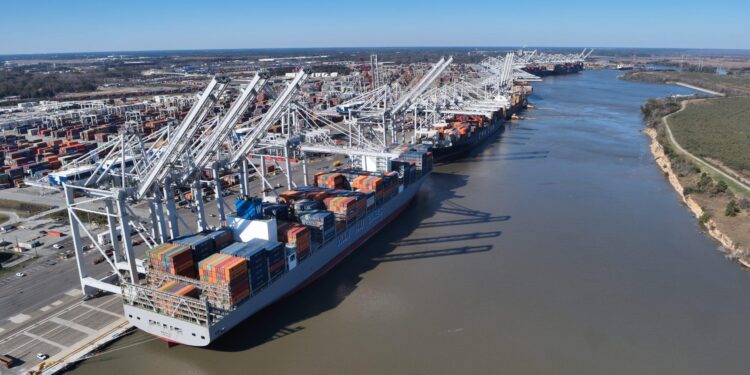The Georgia Ports Authority (GPA) has issued a response to President Donald Trump’s recent tariff deal with Europe, signaling cautious optimism amid ongoing trade tensions. As the White House moves to ease tariffs between the United States and the European Union, GPA leadership weighed in on the potential impacts for the state’s critical shipping hubs and broader supply chain. The development comes as Georgia’s ports continue to navigate a complex global trade environment, where shifts in tariff policy directly influence cargo volumes and economic activity.
Georgia Ports Authority Leadership Addresses Impact of US-European Tariff Agreement
The Georgia Ports Authority (GPA) leadership has issued a formal response to the recent US-European tariff agreement brokered under President Trump’s administration. Recognizing the critical juncture this deal represents for international trade, GPA officials highlighted the potential for increased cargo throughput and strengthened transatlantic partnerships. The agreement is expected to ease some of the heightened tensions that have previously slowed container traffic and disrupted supply chains, particularly affecting exports moving through Georgia’s deepwater ports.
Among their main points of emphasis, GPA leaders underscored the following benefits and challenges:
- Reduction of tariffs, facilitating smoother flow for agricultural and manufactured goods.
- Improved predictability in shipping schedules, which supports efficient port operations.
- The ongoing need to monitor European responses to ensure sustained trade balance.
- Investment in infrastructure upgrades to handle anticipated volume growth.
| Impact Area | Expected Outcome |
|---|---|
| Container Volume | Up to +15% increase annually |
| Export Growth | 10% boost in regional exports |
| Operational Efficiency | Reduced customs delays by 25% |
| Infrastructure Investment | $200 million over 5 years |
Strategic Adjustments Planned to Mitigate Trade Disruptions at Georgia Ports
In response to the evolving tariff policies stemming from the recent agreement between the U.S. and Europe, Georgia Ports Authority (GPA) leadership is implementing a range of strategic measures designed to maintain operational stability. These adjustments focus on enhancing supply chain resilience and diversifying cargo handling capabilities to better align with shifting trade flows. Key initiatives include strengthening partnerships with logistics providers and expanding infrastructure investments to increase throughput efficiency.
Notable strategic actions include:
- Ramp-up of intermodal connectivity to ease congestion and improve inland distribution
- Adoption of advanced cargo tracking technologies for real-time shipment visibility
- Targeted outreach programs to attract alternative international trade routes
- Flexible scheduling enhancements to accommodate fluctuating shipment volumes
| Adjustment Area | Objective | Expected Impact |
|---|---|---|
| Intermodal Expansion | Enhance inland freight movement | Reduced port congestion, faster delivery |
| Technology Integration | Enable real-time tracking | Increased transparency, better planning |
| Market Diversification | Attract new trade lanes | Greater cargo diversity, reduced risk |
Recommendations for Enhancing Competitiveness Amid Changing International Trade Policies
To navigate the complexities introduced by evolving international trade policies, the Georgia Ports Authority (GPA) advises a strategic pivot towards operational efficiency and market diversification. Emphasizing investments in advanced logistics technologies and infrastructure upgrades can reduce turnaround times and enhance supply chain resilience. Additionally, forging stronger partnerships with global stakeholders will enable the port to adapt quickly to shifting tariff landscapes and minimize trade disruptions.
Key strategic approaches recommended include:
- Embracing digitalization: Implementing automated cargo handling systems and real-time tracking tools.
- Expanding regional trade links: Prioritizing alternative markets less affected by tariff fluctuations.
- Enhancing workforce training: Fostering a skilled labor pool adept at managing new technologies and regulations.
| Strategy | Expected Impact | Timeline |
|---|---|---|
| Infrastructure Modernization | Faster Vessel Turnaround | 1-2 Years |
| Digital Platform Integration | Real-time Cargo Visibility | 6-12 Months |
| Trade Partnership Expansion | Diversified Market Access | Ongoing |
In Retrospect
As discussions over international trade agreements continue to evolve, the Georgia Ports Authority remains a key player closely monitoring the implications for regional commerce and global supply chains. Their leadership’s measured response to President Trump’s tariff deal with Europe underscores the complex challenges and opportunities facing U.S. ports amid shifting trade policies. Stakeholders will be watching closely as further developments unfold, impacting the economic landscape of Georgia and the broader Southeastern United States.













